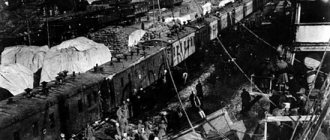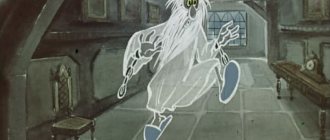Poem “Rural Cemetery” by Vasily Zhukovsky
In the elegy “Rural Cemetery,” written in 1802, Zhukovsky was able to embody the best features of such a literary movement as romanticism. At the same time, the author retained the originality of his creativity. The theme of life and death, the contrast of the dullness of existence with the contrasts of the spiritual world, runs through all of Vasily Andreevich’s poetic works. The background for the event is a twilight landscape, so beloved by all romanticists for the contrast of moods and colors, for expressiveness.
Popular retellings today
- The July Thunderstorm - a summary of Platonov's story
Natasha, together with her younger brother Antoshka, went to the neighboring village to visit her grandparents. On both sides of the road there were fields with tall rye. - A defenseless creature - a summary of Chekhov's story
Having survived a severe attack of gout, Pyotr Alekseevich Kistunov went to work at a bank, fighting the desire to stay at home after a sleepless night. He spoke to visitors in a barely audible voice, like a dying man. - The Tale of the Seven Hanged Men - a summary of Andreev’s work
In “The Tale of the Seven Hanged Men,” the action begins with a description of the hero, who lies in a house unknown to him, where he was brought with his family. He was told the date of death, and that they would die from the bomb. He is assured that he is safe in this house. - Peasant children - a summary of Nekrasov’s poem
In the poem “Peasant Children” Nikolai Nekrasov describes his observations of village children. One day, tired after a hunt, the poet fell fast asleep in the barn. Waking up
Heroes of Elegy
The favorite hero of the romantic poet is himself, that is, Vasily Andreevich Zhukovsky. “Rural Cemetery” depicts the author’s thoughts and feelings, his philosophical reflections. Who but a “singer” not endowed with special hearing is able to understand the joy and pain of life, hear the voices of nature, rise above the bustle of the world in order to embrace the whole world in a single impulse of his soul, to unite with the Universe? The author, like Thomas Gray, dedicates his “cemetery” meditation to the memory of the “poor singer.” At the same time, Zhukovsky deliberately makes his descriptions less visible, enhancing their emotional mood (elegy “Rural Cemetery”).
Analysis of the poem by V. A. Zhukovsky “Rural Cemetery”
V. A. Zhukovsky considered the translation of “Elegy Written in a Rural Cemetery” by the English poet Thomas Gray to be the beginning of his poetic creativity. It was from this translation that a new and original phenomenon of Russian poetry was born - the poem “Rural Cemetery” (1802). The creation of this work was influenced by many reasons: the study of Western European poetry, the experience of the translator, the literary tastes of the time, the artistic preferences of the author, and the debate about the appointment of a person that took place among the poet’s circle of friends.
Following Thomas Gray in the development of poetic thought, Zhukovsky introduces into his translation ideas and moods that express his own worldview. The picture of a modest rural cemetery, the description of which is based on the impression of the surroundings of the poet Mishensky’s native village, sets the author in an elegiac mood:
Under the roof of black pines and bent elms, Which stand hanging all around, Here the forefathers of the village, in secluded tombs, Shut up forever, sleep in a deep sleep.
The poet’s focus is on reflections on the meaning of human life, on his relationship with the world around him. Before us is a skillfully organized flow of feelings and thoughts of a specific person. The elegy represents a change of questions, as if spontaneously arising in the mind of the lyrical hero. The entire poem is a collection of philosophical and moral-psychological motifs, replacing each other, imbued with a sad mood and held together by the general idea of the transience of life and the vicissitudes of happiness. The reflective hero states:
Death is furious at everyone - the king, the favorite of glory, the terrible one is looking for everyone... and will never find...
Developing the idea of equality of all before death, Zhukovsky draws attention to the social contradictions that exist in society. He gives his sympathies not to the “slaves of vanity”, not to the “confidantes of fortune”, but to ordinary villagers, after whom the earth was “sprinkled”. Convinced that all people are equal by nature, he mourns for these simple villagers, born “to be crowned or soar with thoughts,” but died in ignorance by blind chance:
Their fate has burdened their misery with chains, Their genius has been killed by strict need.
In affirming the ideal of natural equality of people, the author is close to the French writer J.-J. Rousseau, whose work he became acquainted with while still in boarding school and, like many young people of that time, became very interested in his philosophy.
The originality of the poem “Rural Cemetery” lies in the poet’s concentration on the internal experiences of the individual, revealed in the organic fusion of nature and human feelings. The transfer of this state is greatly facilitated by the animation of nature: “the day is already growing pale,” “heeded by the moon,” “the quiet voice of the day,” “under the slumbering willow,” “the oak groves were trembling,” “the day of young breath.”
The original translation of “Rural Cemetery” reveals the poetic individuality of the author, who was close to sentimentalism during the creation of the poem. He achieves here an amazing melody and melodiousness of the verse, giving it a soulful intonation.
Recreating everyday life, the poet introduces everyday colloquial vocabulary: “hut”, “beetle”, “shepherd”, “sickles”, “hearth”, “plough”, “herd”. But there are few such words in the elegy. The vocabulary here is predominantly sentimentalist, philosophical and contemplative. The poem is dominated by words related to emotional experiences (“contempt”, “sorrow”, “sigh”, “tears”, “sadly”) and broad thoughts about life (“peace of the silent reign”, “death rages on everyone”, “ almighty destinies"). Epithets and comparisons are sentimental, such as “sad ringing”, “tender heart”, “sweet voice”, “languid eyes”, “meek in heart”, “sensitive in soul”.
The bright emotional and melodic expressiveness of the poem is achieved by the descriptive and lyrical structure of the phrase (“In the foggy twilight the surroundings disappear…”), often used anaphora (“Only occasionally they buzz… They are only heard in the distance”), repetitions (“Silence everywhere, dead sleep everywhere…”) , appeals (“And you, confidantes of fortune”), questions (“Will death soften?”) and exclamations (“Oh, maybe under this grave!”).
So, without being a translation in the full sense of the word, “Rural Cemetery” becomes a work of Russian national literature. In the image of a young poet reflecting in a rural cemetery, Zhukovsky enhances the features of dreaminess, melancholy, and poetic spirituality, significantly bringing this image closer to his inner world and making it as close as possible to the Russian reader, brought up on the sentimental poems of Dmitriev, Kapnist, Karamzin.
The appearance of the “Rural Cemetery” on the pages of the journal “Bulletin of Europe” published by Karamzin brought Zhukovsky fame. It became obvious that a talented poet had appeared in Russian poetry. Zhukovsky's apprenticeship was over. A new stage of his literary activity began.
What is the opposite of death?
The work that Zhukovsky created (“Rural Cemetery”) is very controversial. This poem is characterized by the fact that in it the author objects to himself. Only recently did he call the undisturbed sleep of the dead. That is, the poet spoke about the omnipotence of death. And suddenly, difficultly and slowly, he begins to come to terms with the fact that it is inevitable. At the same time, the author constructs the statement in such a way that it becomes twofold - it is simultaneously a reasoning about a friend-poet who has irretrievably died, and about himself, his inevitable death.
The feeling of hopelessness now sounds, although sad, but not at all hopeless. Death is omnipotent, Zhukovsky admits, but not omnipotent, since there is life-giving friendship on earth, thanks to which the eternal fire of the “tender soul” is preserved, for which the ashes breathe in the urn; it is akin to faith.
Attention, TODAY only!
- “Lyudmila” - ballad by Vasily Zhukovsky: plot, main characters, content
Everything interesting
An excellent poet of the 19th century is Vasily Andreevich Zhukovsky. However, many know him not only as a wonderful poet and writer, but also as a good translator. Zhukovsky loved to translate poets from England, Germany, France and Greece. ...
Sentimentalism is one of the literary movements of the late 18th and early 19th centuries. The founders of this trend were several authors who brought their own features to the theory of sentimentalism. What is sentimentalism Unlike traditional...
Elegy is a genre of lyric poetry. Initially, it was determined by the form of the verse; later, a certain content and mood of the poem became dominant. Currently, an elegy is a work with motives of sadness and thoughtfulness. ...
Vasily Andreevich Zhukovsky is considered one of the founders of romanticism in Russia. This poet put the problems of the inner world of man at the center of his work. As Belinsky said about him, Zhukovsky’s merit is invaluable - he gave “soul and heart”...
New Russian poetry owes its existence largely to its founders, not the least of whom is Vasily Andreevich Zhukovsky. The features of his poetic heritage dissolved, leaving their flavor, in the works of Tyutchev, Blok, Pushkin and...
The poem “The Sea”, written by Zhukovsky at the beginning of the 19th century, aroused admiration among the poet’s contemporaries. Although it was created in 1822, the work was published only in 1829 in the collection “Northern Flowers”. The release of the poem is not...
Vasily Andreevich Zhukovsky brought a new direction to Russian literature - romanticism, which at the beginning of the 19th century was widespread only in Europe. The poet appreciated the simplicity and charm of the poems of this genre and himself created a huge number of works in...
Vasily Zhukovsky is one of the first Russian poets to create clear, simple and easy-to-read works. Before this, writers worked on the principle that the more complex the better. It’s not easy for us to assess the scale of Vasily Andreevich’s genius...
The problem of arranging cemeteries and constantly caring for the burials of our relatives and friends is voluminous, and its solution is a noble cause, both for the authorities and for all citizens.
It is also relevant in our area.
The Oktyabrskoye residents probably noted that in recent months the condition of the rural cemetery located in the village of Oktyabrskoye has changed for the better. “Century-old” garbage dumps have disappeared from the territory of the churchyard (near the gate), the paths have been put in order - now there are no huge holes, potholes and puddles, a metal trailer has been installed. And that's not all the changes.
As it turned out, this is our fellow villager Evgeniy Pirog
appealed to the administration of the Oktyabrsky rural settlement, where he entered into a free of charge agreement to carry out work to improve the territory intended for burial and maintain it in proper condition. At the meeting, Evgeniy Viktorovich shared his plans for the future and talked about what had already been done.
From July 2, 2021, the cemetery’s operating hours have been determined, that is, the movement of vehicles is limited. We closed the large gate, but hung a sign with a telephone number where you can call with questions at any time,” says Evgeniy Viktorovich. – And if necessary - in the case of burials, installation of monuments and improvement of graves, there are no problems with opening the gates. Although there have already been complaints about the locked gate, I consider them unfounded. Now a book will be kept to record the registration of burials.
In the village graveyard, the area for new burials has also been cleared and leveled, and weeds have been destroyed. As my interlocutor explained, a resident of the village provides great free assistance in removing garbage heaps, especially before Parents' Day. Oktyabrskoye Anatoly Kornilov
. Thanks to him for doing the right thing.
In the future, we want to equip an administrative building from the iron trailer that was installed near the central gate,” continues Evgeniy Viktorovich. – We have already installed electrical poles, we want to install lighting and video surveillance here. Video cameras will prevent theft of grave fences, and such cases have already happened.
If the administration of the Oktyabrsky rural settlement allocates the necessary funds, in the future we will be able to fill the central paths in the rural churchyard with crushed stone, and we will manufacture and install new gates and fencing.
Every spring, usually before Radonitsa, employees of the Oktyabrsky rural administration, together with residents, carry out a general cleaning of the cemetery. Each person tries to tidy up the graves of their relatives and friends and collects the garbage that has accumulated over the winter. But not everyone takes it to places designated for this. As a result, huge landfills appear in one place or another. And some parts of the rural churchyard appear in a very unsightly form. It’s painful to look at abandoned graves overgrown with grass. I just want to say, good people, cleaning up the cemetery is the sacred duty of each of us, so don’t put off until later such a good deed as cleaning up your native hills. It is not difficult, and there will be more order in this holy place.
In this article we will analyze the elegy that Zhukovsky wrote in 1802, “Rural Cemetery.” This work belongs to romanticism and has its characteristic features and features.
For early Zhukovsky, his favorite time of day was the transition from dusk to evening, from day to night, from darkness to dawn. During these hours and minutes, a person feels that he himself is changing, that not everything is over yet, that life is full of mystery and unpredictable, and death is perhaps only the transition of the soul to an unknown, different state.
Death motive
We continue to describe this work and analyze it. Zhukovsky created “Rural Cemetery” as a reflection on the meaning of life, the perishability of existence. Here we are, finally, approaching the tragically intense center of the elegy. The motive of death begins to sound more and more insistently in her. The author of the work, trying to enhance the already gloomy, heavy mood, intensifies the drama with additional means. The sleep of the deceased is called “unbreakable.” Consequently, even the hope of the future resurrection of the dead, their “awakening”, is not allowed. The fifth stanza is entirely built on a whole series of negations such as “neither... nor... nothing,” and ends with a harsh formula that says that nothing will force those who rest there to come out of the tombs.
Death motive
We continue to describe this work and analyze it. Zhukovsky created “Rural Cemetery” as a reflection on the meaning of life, the perishability of existence. Here we are, finally, approaching the tragically intense center of the elegy. The motive of death begins to sound more and more insistently in her. The author of the work, trying to enhance the already gloomy, heavy mood, intensifies the drama with additional means. The sleep of the deceased is called “unbreakable.” Consequently, even the hope of the future resurrection of the dead, their “awakening”, is not allowed. The fifth stanza is entirely built on a whole series of negations such as “neither... nor... nothing,” and ends with a harsh formula that says that nothing will force those who rest there to come out of the tombs.
Sound recording
This effect intensifies in the second stanza. Here visual images (albeit translated into another, emotional plane) are relegated to second place, giving way to sound ones. The more darkness in the world that the poet describes becomes impenetrable, the more the lyrical hero is guided by sound. In the second stanza, the main artistic load falls precisely on sound writing, and not on epithets. It is no coincidence that Zhukovsky uses this technique in his work. Thanks to him, the poem “Rural Cemetery” becomes more expressive.
Doubling, drawn-out sonorous “n”, “m”, as well as hissing “sch”, “sh” and whistling “z”, “s” create the image of a dead sleep of nature. The third line, with the abundance of these sounds, seems simply onomatopoeic to us. However, it also “works” to create a certain mood, by no means peaceful and calm, which is characteristic of the first stanza, but alarming.
From line to line, the work that Zhukovsky wrote (“Rural Cemetery”) becomes darker and darker. Like a signal bell, at the end of the second stanza a word sounds that plays the role of a kind of stylistic password in the genre of elegy: “dull.” This adjective means “immersed completely in sadness, merged with this feeling, not knowing any other mood, completely losing hope.” Almost synonymous with a mournful sound - dull, that is, sad, monotonous, cutting right to the heart.
The conventional landscape beloved by the pre-Romanticists in the third stanza deepens this mood. A wild owl, an ancient vault, the moon pouring its deathly pale light onto nature... If the peasant’s hut in the first stanza was called the word “calm” and nothing disturbed this equanimity, then in the third the “peace” of the quiet dominion of the tower was disturbed.
The inevitability of death for everyone
Developing the theme, Vasily Andreevich extends his bitter conclusion to all people that death will sooner or later affect everyone: both ordinary people and kings, because even the “path of greatness” leads to the tomb.
Death is cruel and merciless, as its analysis shows. “Rural Cemetery” (Zhukovsky) describes her actions. Death indifferently takes away tender hearts that knew how to love, destined to “be in the crown,” but at the same time bound by “squalor in chains” (peasant ignorance and poverty), and the ashes of the one who was born in order to “conquer fortune,” fight the “storm of troubles”.
Here the poet’s voice, which recently sounded bitter, accusatory, almost angry, suddenly softens. As if having reached a certain limit, approaching despair, the author’s thought smoothly returns to the point of peace, and this is where the work that Zhukovsky created (“Rural Cemetery”) begins. This poem, therefore, takes us to a certain initial state, just as life returns everything to normal. It is not without reason that the word that echoed in the first stanza (“calm hut”), subsequently rejected in the second, again takes its rightful place in the poetic language of Vasily Andreevich.
Sound recording
This effect intensifies in the second stanza. Here visual images (albeit translated into another, emotional plane) are relegated to second place, giving way to sound ones. The more darkness in the world that the poet describes becomes impenetrable, the more the lyrical hero is guided by sound. In the second stanza, the main artistic load falls precisely on sound writing, and not on epithets. It is no coincidence that Zhukovsky uses this technique in his work. Thanks to him, the poem “Rural Cemetery” becomes more expressive.
Doubling, drawn-out sonorous “n”, “m”, as well as hissing “sch”, “sh” and whistling “z”, “s” create the image of a dead sleep of nature. The third line, with the abundance of these sounds, seems simply onomatopoeic to us. However, it also “works” to create a certain mood, by no means peaceful and calm, which is characteristic of the first stanza, but alarming.
From line to line, the work that Zhukovsky wrote (“Rural Cemetery”) becomes darker and darker. Like a signal bell, at the end of the second stanza a word sounds that plays the role of a kind of stylistic password in the genre of elegy: “dull.” This adjective means “immersed completely in sadness, merged with this feeling, not knowing any other mood, completely losing hope.” Almost synonymous with a mournful sound - dull, that is, sad, monotonous, cutting right to the heart.
The conventional landscape beloved by the pre-Romanticists in the third stanza deepens this mood. A wild owl, an ancient vault, the moon pouring its deathly pale light onto nature... If the peasant’s hut in the first stanza was called the word “calm” and nothing disturbed this equanimity, then in the third the “peace” of the quiet dominion of the tower was disturbed.







